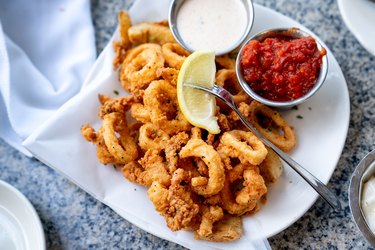
Squid is a type of seafood often called calamari. You can steam or boil squid and add it to pasta, prepare it fried or eat it dried as a snack. While most of the vitamin and mineral content is similar between steamed, fried and dried squid, there are some major nutritional differences to take note of.
Warning
There are health benefits of eating squid because it's high in nutrients like protein, vitamin B12, zinc, phosphorous, vitamin E and magnesium, but its cholesterol and sodium content make it a food you should eat in moderation.
People who have or are at risk for heart disease are advised to limit dietary cholesterol to less than 200 milligrams per day, while those who are not at risk should still aim to eat less than 300 milligrams, per the University of California.
Just as well, a diet high in sodium is linked to a higher risk of heart disease and stroke, and adults should limit the amount they eat to 2,300 milligrams per day, according to the USDA 2020-2025 Dietary Guidelines for Americans.
Video of the Day
Squid Nutrition
According to the USDA, a 4-ounce serving of steamed or boiled squid will give you:
Video of the Day
- Calories: 200
- Total fat: 3 g
- Saturated fat: 0.8 g
- Trans fat: 0 g
- Cholesterol: 507.1 mg
- Sodium: 467.8 mg
- Total carbs: 6.7 g
- Dietary fiber: 0 g
- Sugar: 0 g
- Protein: 33.9 g
Macros
- Total fat: A 4-ounce serving of steamed or boiled squid has 3 grams of total fat, which includes 0.8 grams of saturated fat and 0 grams of trans fat.
- Carbohydrates: A 4-ounce serving of squid has 6.7 grams of carbs, which includes 0 grams of fiber and 0 grams of sugar.
- Protein: A 4-ounce serving of squid has 33.9 grams of protein.
Vitamins, Minerals and Other Micronutrients
- Vitamin B12: 109% Daily Value (DV)
- Zinc: 30% DV
- Phosphorus: 29% DV
- Vitamin E: 17% DV
- Magnesium: 17% DV
- Potassium: 10% DV
- Vitamin C: 9% DV
- Iron: 7% DV
- Calcium: 5% DV
Dried Korean Squid Nutrition
Seafood is a central part of Korean culture. Dried Korean squid can be eaten as a snack on its own, or as part of a recipe for lunch or dinner. Korean dried squid can be a nutritious addition to your diet if you eat it in moderation.
According to the USDA, a 2-ounce serving of dried Korean squid will give you:
- Calories: 204
- Total fat: 3.4 g
- Saturated fat: 2.3 g
- Trans fat: 0 g
- Cholesterol: 895.9 mg
- Sodium: 680.4 mg
- Total carbs: 4.5 g
- Dietary fiber: 0 g
- Sugar: 0 g
- Protein: 40.8 g
Macros
- Total fat: A 2-ounce serving of dried Korean squid has 3.4 grams of total fat, which includes 2.3 grams of saturated fat and 0 grams of trans fat.
- Carbohydrates: A 2-ounce serving of dried Korean squid has 4.5 grams of carbs, which includes 0 grams of fiber and 0 grams of sugar.
- Protein: A 2-ounce serving of dried Korean squid has 40.8 grams of protein.
Vitamins, Minerals and Other Micronutrients
- Iron: 18% Daily Value (DV)
Korean dried squid is higher in dietary cholesterol than steamed or boiled squid, with about 896 milligrams, or 299 percent of the recommended DV, in a 2-ounce serving. It's also higher in sodium because salt is added during the drying process. Dried Korean squid clocks in around 680 milligrams of sodium, which is 30 percent of the recommended DV.
Fried Calamari Nutrition
Fried calamari is made by coating raw squid in batter and frying it in oil, and it often appears on restaurant menus as an appetizer.
According to the USDA, a 4-ounce serving of fried calamari will give you:
- Calories: 198
- Total fat: 8.5 g
- Saturated fat: 2.1 g
- Trans fat: 0 g
- Cholesterol: 294.8 mg
- Sodium: 347.4 mg
- Total carbs: 8.8 g
- Dietary fiber: 0 g
- Sugar: 0 g
- Protein: 20.3 g
Macros
- Total fat: A 4-ounce serving of fried calamari has 8.5 grams of total fat, which includes 2.1 grams of saturated fat and 0 grams of trans fat.
- Carbohydrates: A 4-ounce serving of fried calamari has 8.8 grams of carbs, which includes 0 grams of fiber and 0 grams of sugar.
- Protein: A 4-ounce serving of fried calamari has 20.3 grams of protein.
Vitamins, Minerals and Other Micronutrients
- Copper: 266% Daily Value (DV)
- Selenium: 107% DV
- Vitamin B12: 58% DV
- Riboflavin (B2): 40% DV
- Phosphorus: 23% DV
- Niacin (B3): 18% DV
- Zinc: 18% DV
- Vitamin B5: 12% DV
- Magnesium: 10% DV
- Iron: 6% DV
While fried calamari is high in protein and many other important vitamins and minerals in it, it's also higher in fat because it is cooked in oil. That being said, you may be better off eating squid as a protein source if it's prepared in other, more nutritious ways, like steaming, boiling or grilling.